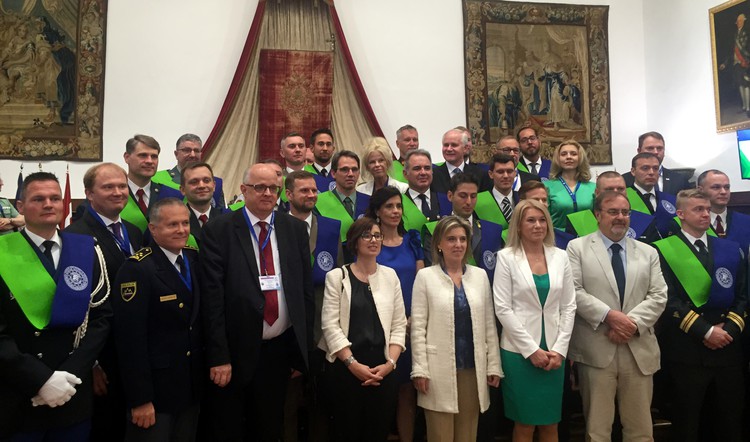Today, 23 members of the inaugural class of the Frontex Joint Master’s in Strategic Border Management programme took part in the graduation ceremony in Salamanca, Spain.
The Joint Master’s programme is Europe’s only such specialised degree. It was developed by the agency, in collaboration with six partner universities and more than 20 EU border guard training organisations and academies.
“This Master’s programme is a great opportunity for all EU member states, which don’t have the resources to establish such a programme at a national level, to provide an academic professional development opportunity for their high level officers in a European framework,” said Frontex Deputy Executive Director Berndt Koerner, who attended the ceremony.
“Currently there is no other higher education programme at master’s level in Europe focused on border management from a strategic point of view. It is a cost-effective investment in European border and coast guard executive education,” he added.
The 23 graduates from 16 countries representing 17 national organisations received a joint master’s degree co-awarded by five higher education institutions: the Rezekne Academy of Technologies from Latvia, Mykolas Romeris University from Lithuania, the Netherlands Defence Academy Faculty of Military Science, National University for Distance-Learning Education from Spain and University of Salamanca, in collaboration with Estonian Academy of Security Sciences.
The Joint Master’s programme reflects one of Frontex’s core commitments to support education and development of national border guards by establishing common training standards at the European level.
Over 18 months, the students covered topics including risk and threat management, innovation and technology related to border management, fundamental rights and EU borders policies and strategies. The programme consisted of 10 modules delivered by 84 experienced border and coast guard professionals and high profile academics from 13 countries.
The Joint Master’s programme aims to promote interoperability and the highest standards at EU borders, while protecting and promoting fundamental rights in border management. It empowers European border guard managers to rely on and apply professional judgment by developing the skills acquired through problem-solving in a professional context.
